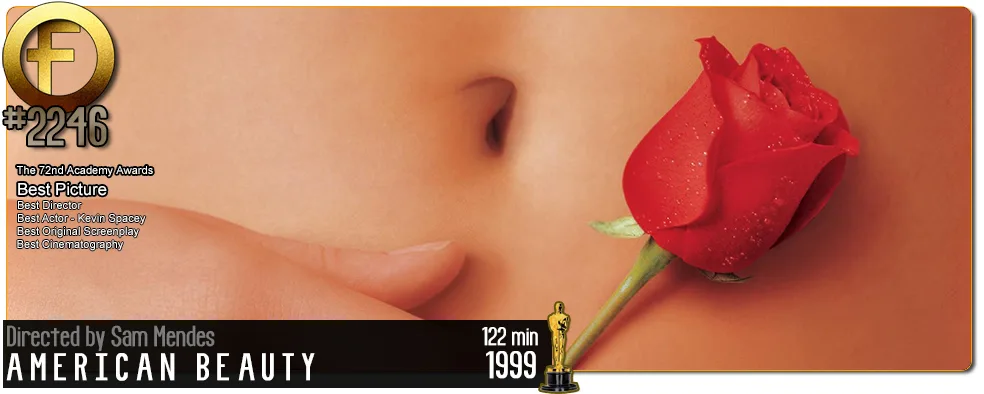Movie Review – American Beauty
Principal Cast : Kevin Spacey, Anette Bening, Chris Cooper, Thora Birch, Wes Bentley, Mena Suvari, Peter Gallagher, Allison Janney, Scott Bakula, Sam Robards, Amber Smith.
Synopsis: A sexually frustrated suburban father has a mid-life crisis after becoming infatuated with his daughter’s best friend.
********
Despite recent off-screen legal issues in his personal life, the career of Kevin Spacey – particularly during the 90’s – is one of the more remarkable in Hollywood history. After a breakout role in The Usual Suspects in 1995, aged 36, Spacey would cement his award-winning career with memorable turns in both Se7en the same year, LA Confidential in ’97, and as Lex Luthor in the ill-fated Superman Returns. I would argue, however, that American Beauty, of all his early films, boasts perhaps his most finely honed and nuanced leading role, snagging him his second acting Oscar. This 1999 masterpiece, directed by Sam Mendes and penned by Alan Ball, remains a striking emblem of modern cinema. With a rich tapestry of complex characters and an intricate narrative that peers beneath the veneer of suburban life, the film’s insights still resonate today. In this comprehensive analysis, we will delve deep into the themes, performances, and subtext of American Beauty, a film that artfully dissects the American Dream and the masculinity of the late 20th century.
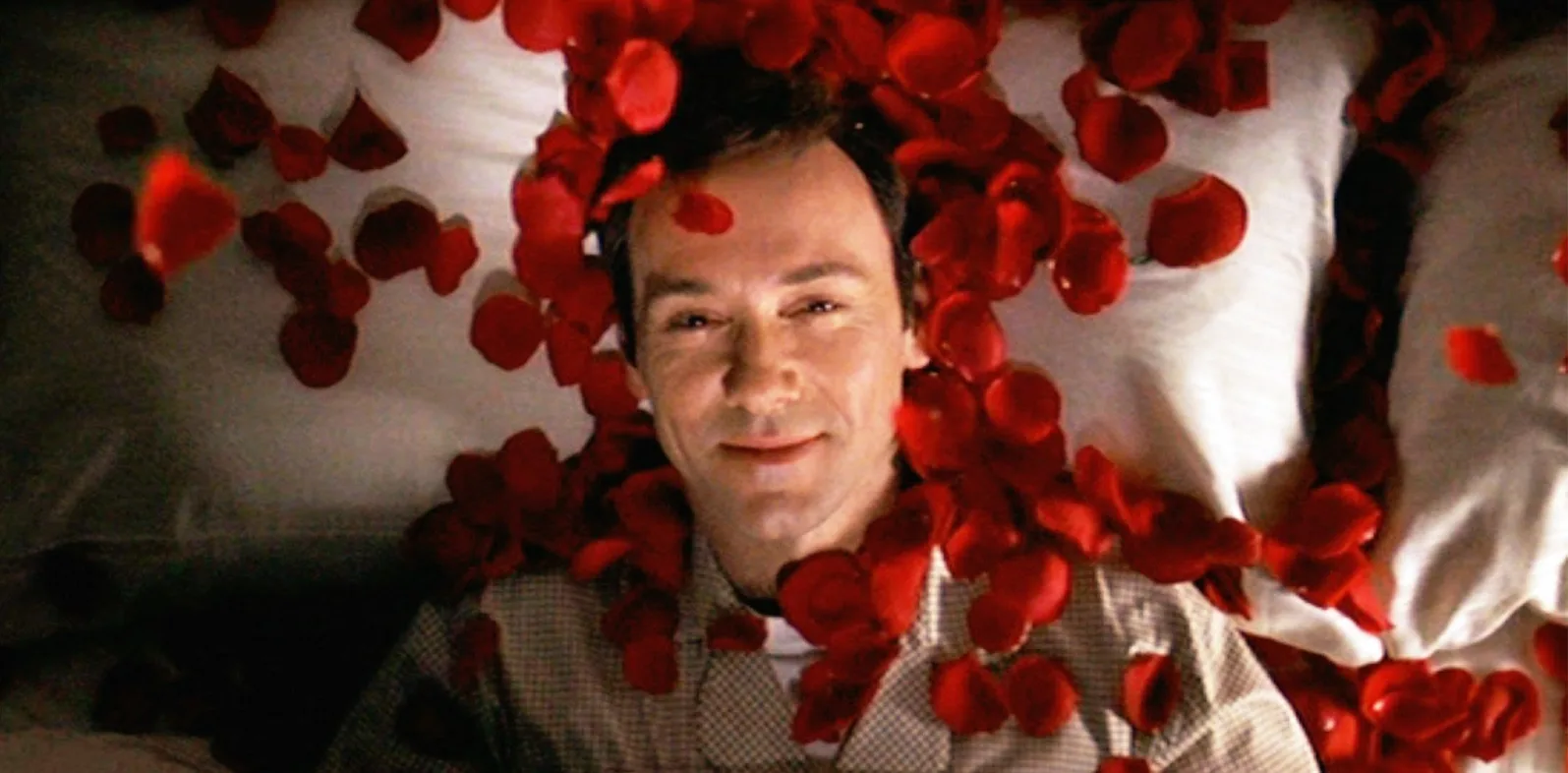
American Beauty takes us into the seemingly tranquil existence of Lester Burnham (Spacey). Lester is a middle-aged man trapped in the mundane routine of suburban life. He’s an emblematic representative of the American everyman, entangled in the web of societal expectations and the quest for material success. Amid the white picket fences and manicured lawns, the Burnham family’s façade of normalcy begins to crumble. Annette Bening delivers a tour-de-force performance as Carolyn Burnham, Lester’s wife. She’s a real estate agent desperately clinging to her illusion of perfection, exemplifying the obsession with image and social status so prevalent in suburban America. Their daughter, Jane, portrayed by Thora Birch, is an angsty teenager who embodies the rebellion and disconnection often associated with youth. Her narrative arc forms a compelling contrast to the adults around her, revealing a generation gap steeped in disillusionment. The Burnham’s life takes a surreal twist with the arrival of Ricky Fitts (Wes Bentley), a young filmmaker who captures beauty in the most unexpected places. His relationship with Jane ignites a sense of awakening and vulnerability in her, serving as a catalyst for self-discovery. Furthermore, American Beauty introduces us to Colonel Frank Fitts (Chris Cooper), a man haunted by his own demons and a reflection of the rigid conformity that defines the societal norms of the time. His son, Ricky, represents the antithesis of this rigidity, embracing a countercultural philosophy that challenges the established order.
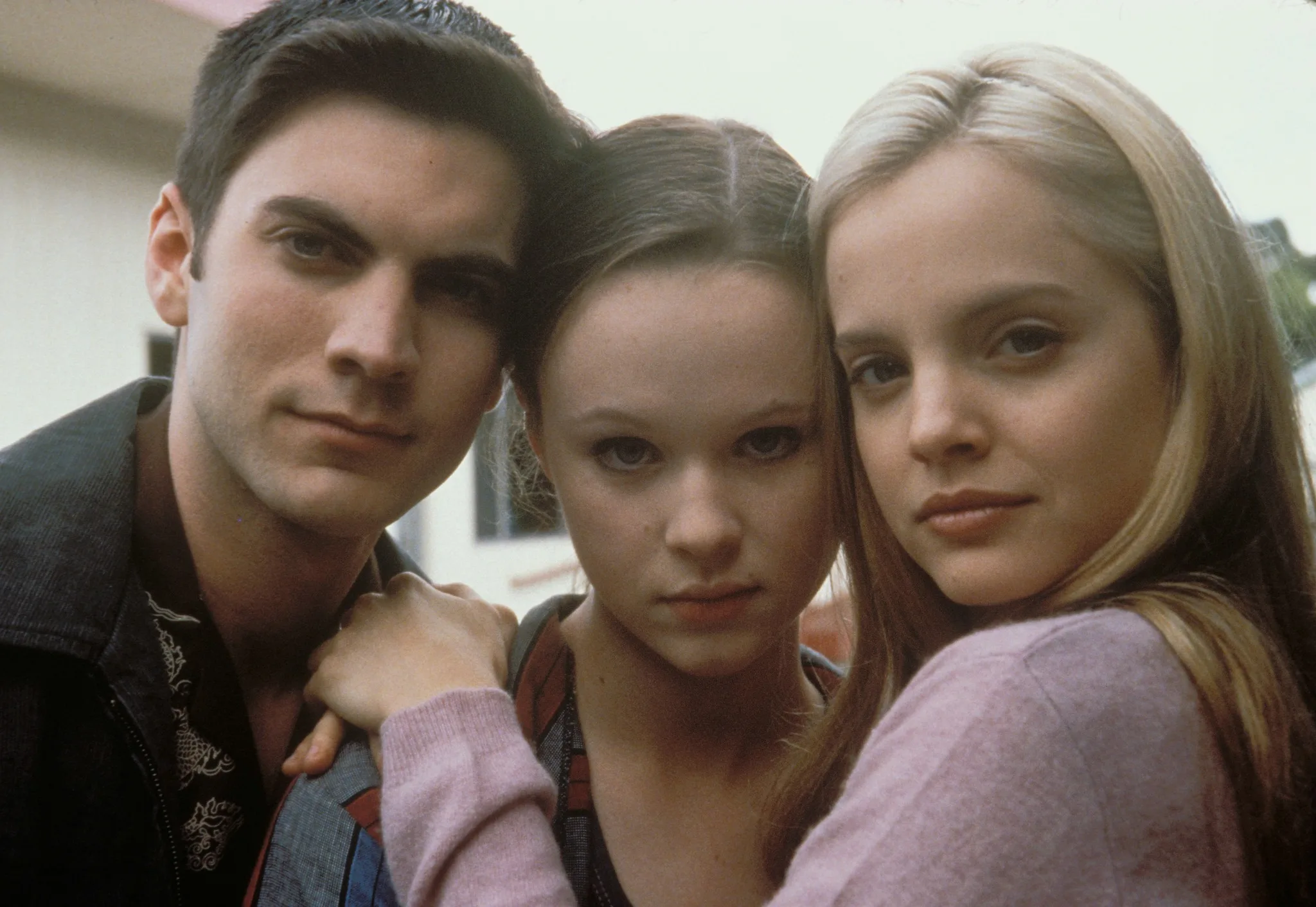
In a film that hinges on the complexity of its characters, the performances of the cast are nothing short of stellar. Kevin Spacey’s portrayal of Lester Burnham is a masterclass in subtle transformation. He evolves from a complacent, uninspired cog in the suburban wheel to a liberated soul who rediscovers his zest for life. Spacey’s portrayal captures the quintessential mid-life crisis, and his on-screen charisma is undeniable. Annette Bening’s Carolyn Burnham is a character whose veneer of perfection masks a profound emptiness. Bening navigates the nuances of her character with finesse, painting a vivid portrait of a woman desperately clinging to an illusion of success. Thora Birch as Jane Burnham offers a portrayal of teenage angst and rebellion that feels authentic and relatable. Her journey is a poignant reflection of the struggle to find identity in a world dominated by conformity. Wes Bentley’s Ricky Fitts is a revelation. He embodies the countercultural spirit of the late 20th century, challenging societal norms and conventional expectations. Bentley’s performance is a magnetic force that draws us into Ricky’s enigmatic world. Chris Cooper’s Colonel Frank Fitts is a character shrouded in mystery and suppressed desires. Cooper’s portrayal captures the complexity of a man who grapples with his inner demons while projecting an authoritative façade. The supporting cast, including Mena Suvari, Allison Janney, and Peter Gallagher, adds depth to the film’s ensemble, enhancing the intricate tapestry of characters that populate this suburban landscape.
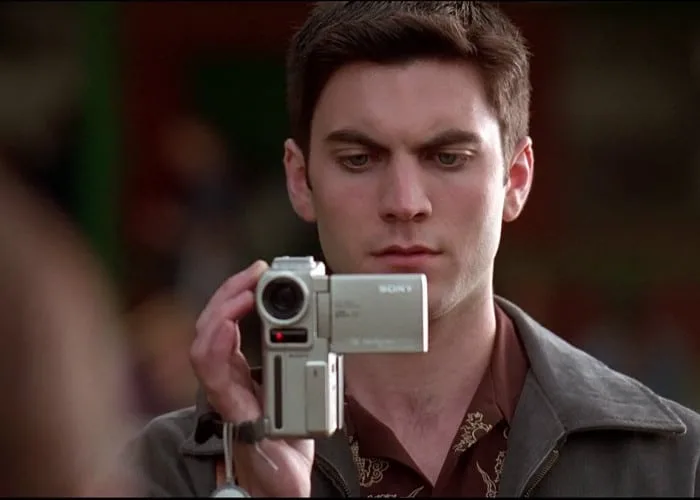
American Beauty serves as a profound exploration of the American Dream and the discontents that lie beneath its surface. The film peels back the layers of suburban life to reveal the emptiness that can fester behind the veneer of material success. The Burnham family’s struggles reflect the universal desire for fulfilment and authenticity in a society driven by appearances and materialism. Lester’s mid-life crisis is emblematic of a generation that aspired to the traditional markers of success but found themselves grappling with disillusionment and a yearning for more. His infatuation with Jane’s friend, Angela Hayes, portrayed by Mena Suvari, is a poignant illustration of his misguided pursuit of youth and vitality. The film’s subtext delves into the complex nature of American masculinity in the late 20th century. Lester Burnham’s transformation, driven by his desire to regain his youth and assert his masculinity, reflects the societal pressure placed on men to conform to conventional ideals of success and virility. Ricky Fitts, on the other hand, represents a countercultural masculinity that challenges these norms. His character defies expectations and embraces vulnerability and sensitivity, ultimately redefining what it means to be a man in a society steeped in traditional gender roles. Carolyn Burnham’s character underscores the pressures placed on women to maintain an idealized image of success and perfection. Her desperation to achieve success as a real estate agent and her obsession with material possessions are symptoms of a culture that often values image over substance.
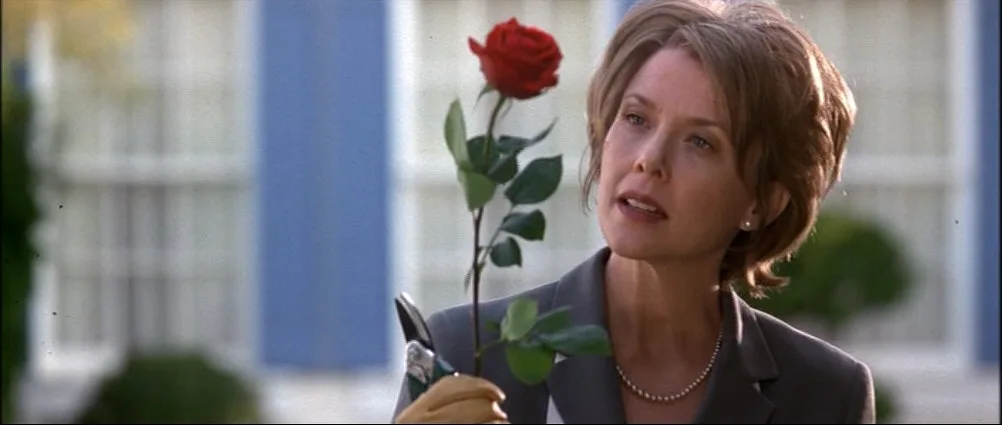
This is a film that thrives on subversion. It challenges societal norms and expectations, inviting the audience to question the conventions that define our lives. The film’s use of roses as a recurring motif serves as a symbol of the hidden beauty and complexity that lies beneath the surface. The character of Lester Burnham undergoes a metamorphosis that is both liberating and tragic. His quest for authenticity and the pursuit of his desires ultimately lead to his downfall. In his death, the film sends a powerful message about the consequences of challenging societal norms. The relationship between Jane and Ricky is a testament to the transformative power of connection and vulnerability. Their budding romance defies the superficiality of their surroundings and serves as a beacon of hope in a world that often values conformity over individuality.
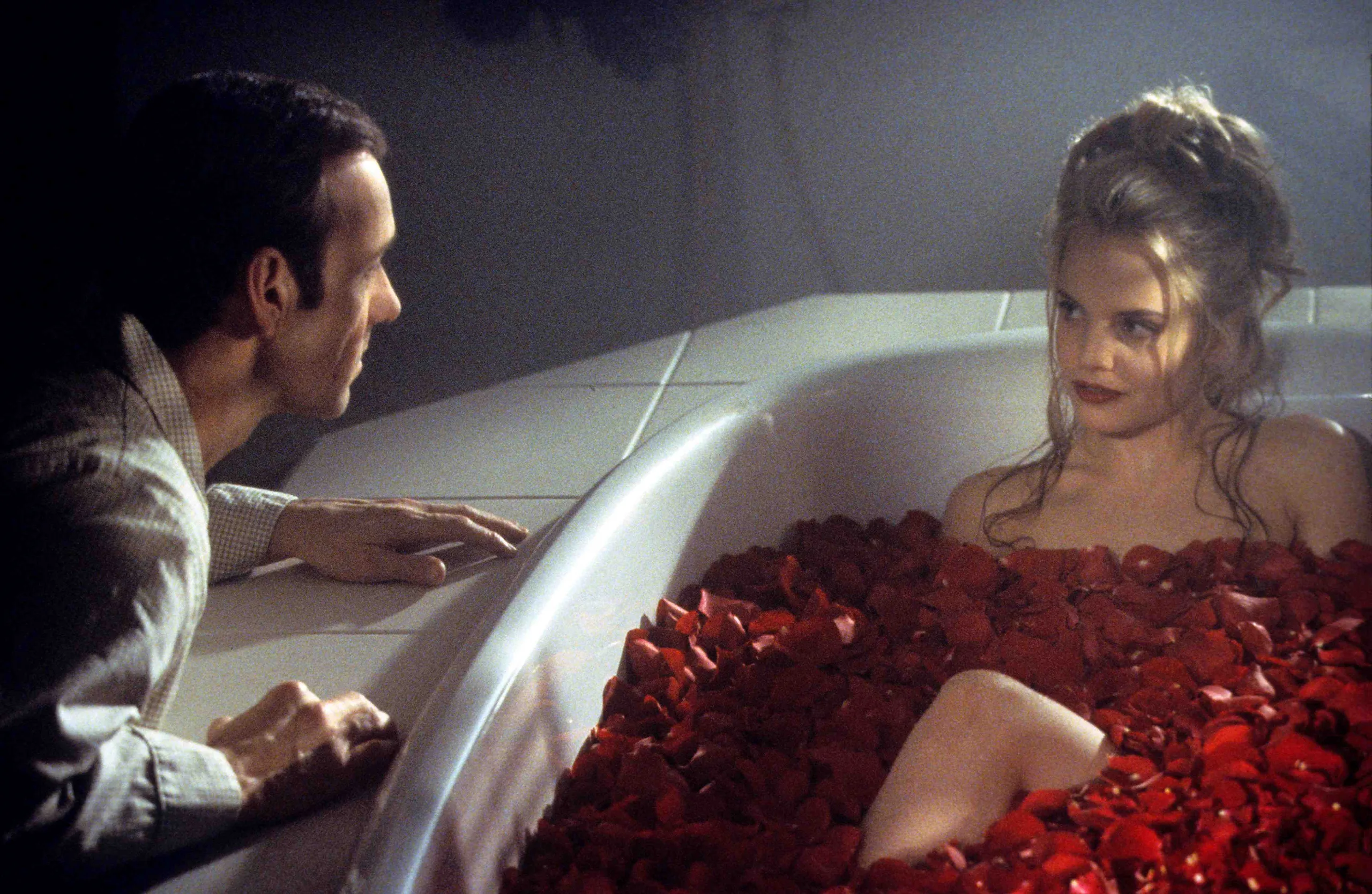
American Beauty remains a film titan that continues to captivate and provoke thought. Its exploration of the American Dream, suburban discontent, and the complexities of American masculinity is as relevant today as it was in 1999. The performances of Kevin Spacey, Annette Bening, and the entire cast are a testament to the depth of character development and storytelling that defines this film. American Beauty invites us to peel back the layers of our own lives, question the conventions that bind us, and seek the beauty that often lies hidden beneath the surface. It’s a film that challenges us to embrace authenticity and vulnerability, even in a world that often values appearances over substance. Within it, we find a reflection of our own desires, discontents, and the enduring quest for meaning and fulfilment in a society that often thrives on illusion. It’s a film that leaves an indelible mark, a reminder that beauty, in all its complexity, can be found even in the most unexpected places. In the words of Lester Burnham, “Sometimes there’s so much beauty in the world, I feel like I can’t take it… and my heart is going to cave in.”

